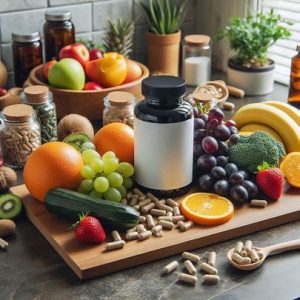 Did you know that what you eat directly affects your brain and body performance? Research has consistently shown that a balanced diet plays a pivotal role in boosting mental clarity, emotional well-being, and physical performance. For men, who often face unique health challenges, nutrition is a key factor in maintaining optimal strength—mentally and physically.
Did you know that what you eat directly affects your brain and body performance? Research has consistently shown that a balanced diet plays a pivotal role in boosting mental clarity, emotional well-being, and physical performance. For men, who often face unique health challenges, nutrition is a key factor in maintaining optimal strength—mentally and physically.
A proper diet is not just about building muscles or shedding pounds. It’s about fueling your body and mind for peak performance in every aspect of life. However, many men fall into the trap of quick fixes and harmful solutions that promise immediate results but do more harm than good. Themalecoachmalepsychology highlights how modern practices, like male enhancement, can damage the psyche, urging men to prioritize healthful, sustainable approaches.
The Link Between Diet and Mental Clarity
The brain requires energy to function efficiently, and this energy comes directly from the food you consume. Diets high in processed sugars and unhealthy fats can cause energy crashes, mental fog, and poor concentration. On the other hand, incorporating nutrient-rich foods such as whole grains, lean proteins, and healthy fats improves focus and cognitive function.
Essential nutrients like omega-3 fatty acids, found in fish and walnuts, are critical for brain health. They enhance memory, reduce inflammation, and may lower the risk of mental health issues like depression and anxiety. Antioxidants from fruits and vegetables combat oxidative stress, which can negatively affect brain function.
Why Men Need to Pay Attention
Men often juggle demanding jobs, family responsibilities, and fitness goals. Poor dietary choices can exacerbate stress and fatigue, further lowering productivity and emotional stability. A nutrient-dense diet helps regulate neurotransmitters, leading to better mood stability and resilience against stress.
Emotional Well-Being and Food
It’s not just the brain that benefits from healthy eating—your emotional health is also directly linked to your diet. Foods rich in vitamins like B12 and minerals such as magnesium improve serotonin production, commonly known as the “happiness hormone.”
Sugar and caffeine may give a short-term mood boost but often result in energy crashes, leaving you irritable or anxious. A diet balanced with complex carbohydrates, fresh vegetables, and lean proteins ensures a steady energy flow and emotional equilibrium throughout the day.
Foods to Support Emotional Health
- Dark Leafy Greens: Spinach and kale are loaded with folate, which helps produce mood-regulating neurotransmitters.
- Fatty Fish: Salmon and mackerel are excellent sources of omega-3s, which reduce symptoms of anxiety and depression.
- Nuts and Seeds: Rich in magnesium, they support relaxation and calmness.
Physical Performance Starts in the Kitchen
When it comes to physical performance, men often focus on exercise routines while neglecting the critical role of nutrition. Your body needs the right fuel to repair muscles, build strength, and sustain stamina.
Protein is a cornerstone for muscle repair and growth. Men aiming for peak performance should include lean protein sources like chicken, fish, eggs, and plant-based options like lentils. Carbohydrates are equally important as they provide energy for workouts and recovery.
Hydration: The Overlooked Hero
Staying hydrated is essential for physical and mental health. Dehydration can cause fatigue, muscle cramps, and even a decline in cognitive function. Drinking plenty of water and including hydrating foods like cucumbers and watermelon helps keep your body functioning at its best.
Building Sustainable Habits
The key to maintaining good health isn’t perfection—it’s consistency. Crash diets and extreme calorie restrictions may work temporarily but often lead to long-term issues like nutrient deficiencies and burnout. Instead, focus on gradual, sustainable changes to your eating habits.
Start by adding more whole foods to your plate and cutting back on processed snacks. Plan meals ahead to avoid unhealthy takeout choices, and consider consulting a nutritionist for tailored advice.
READ ALSO: How Nootropics and Brain Boosters Enhance a Balanced Diet
Final Thoughts
Eating for strength is more than just fueling your workouts. It’s about creating a lifestyle that supports your mental clarity, emotional well-being, and physical performance. By making smart, sustainable dietary choices, men can enhance their quality of life and protect their health for the long term.
Remember, the path to optimal health starts with the first bite. Every meal is an opportunity to nourish your body and mind, setting you up for success in every area of life.
 A balanced diet does more than nourish the body; it can also provide essential support for brain health. Nootropics—also known as brain boosters—offer powerful benefits when combined with a nutrient-dense diet. From enhancing focus and memory to promoting mental clarity, nootropics can amplify the brain’s performance naturally. Incorporating foods like green tea, dark chocolate, and omega-3s can significantly boost your cognitive wellness.
A balanced diet does more than nourish the body; it can also provide essential support for brain health. Nootropics—also known as brain boosters—offer powerful benefits when combined with a nutrient-dense diet. From enhancing focus and memory to promoting mental clarity, nootropics can amplify the brain’s performance naturally. Incorporating foods like green tea, dark chocolate, and omega-3s can significantly boost your cognitive wellness.